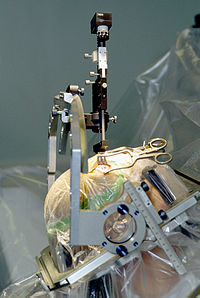
Photo from wikipedia
BACKGROUND Virtual surgical planning (VSP) is increasingly described in craniofacial surgery literature. However, the quality of the literature that has been published is unknown. The objective of this systematic review… Click to show full abstract
BACKGROUND Virtual surgical planning (VSP) is increasingly described in craniofacial surgery literature. However, the quality of the literature that has been published is unknown. The objective of this systematic review was to determine the level of evidence of published articles on VSP. METHODS In this systematic review, PubMed, Web of Science, and ScienceDirect databases were queried for key terms in craniofacial VSP. Inclusion and exclusion criteria concentrated on patient-specific surgical outcomes in studies that could be rated for level of evidence. The articles were ranked according to their level of evidence, with level I being the highest level of evidence (randomized-controlled trials) and level V being the lowest (eg, case reports). RESULTS The initial keyword search yielded 1524 articles, 273 of which were ranked and included in the systematic review. The average level of evidence for an article published was 4.1 (between level IV and level V). Level IV was the most common level of evidence (65.6%), followed by level V (24.9%), level III (7.3%), level II (2.2%), respectively. There were not any level I articles. The most common study type was case series, accounting for 68.1% of the studies, followed by case reports (23.0%), case-control studies (4.7%), cohort studies (3.3%), and randomized controlled trials (1.1%), respectively. CONCLUSION Although the quantity of craniofacial VSP studies has proliferated, the quality of the studies has not. In order for VSP literature to feature a higher level of evidence, future studies would require more sophisticated study design, such as prospective cohort or prospective randomized control trials.
Journal Title: Journal of Craniofacial Surgery
Year Published: 2019
Link to full text (if available)
Share on Social Media: Sign Up to like & get
recommendations!